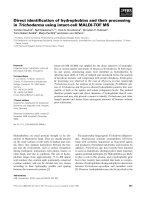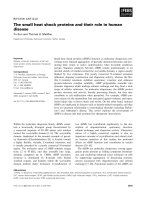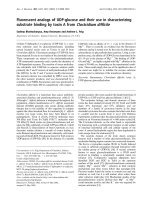Food Additives and their use in seafood Feb 2011
Bạn đang xem bản rút gọn của tài liệu. Xem và tải ngay bản đầy đủ của tài liệu tại đây (106.4 KB, 3 trang )
Industry guidance note
Legislation
February 2011
Food additives and their
use in seafood
As with most food products, seafood may require the use of additives to perform necessary
technical functions within the food itself, or during seafood processing. Whether the use of
additives needs to be declared will depend on the stage it was used during seafood
processing, or the function it performs in the final product. All additives must be authorised
for use in the particular food product.
This guidance note defines additives, how they are evaluated, the authorisation procedure
and lists food additives permitted in certain seafood products.
What are additives?
Food additives are substances added intentionally to foodstuffs to perform certain technological
functions, for example to colour, to sweeten or to preserve.
Food additives are defined in Community legislation as:
"any substance not normally consumed as a food in itself and not normally used as a characteristic
ingredient of food, whether or not it has nutritive value, the intentional addition of which to food for
a technological purpose in the manufacture, processing, preparation, treatment, packaging,
transport or storage of such food results, or may reasonably be expected to result, in it or its byproducts becoming directly or indirectly a component of such foods.”
Authorisation
Before food additives can be used in a food product they must be authorised at EU level. Most
food additives may only be used in limited quantities in certain foodstuffs. If no quantitative limits
are prescribed for the use of a food additive, it must be used according to good manufacturing
practice, i.e. only as much as necessary to achieve the desired technological effect.
Food additives may only be authorised if:
There is a technological need for their use;
They do not mislead the consumer;
They present no hazard to the health of the consumer.
2
FS61 0211 February 2011 Food additives and their use in seafood
Evaluation
Prior to their authorisation, food additives are evaluated for their safety by the European Food
Safety Authority (EFSA), which provides the European Commission with independent scientific
advice on food and feed safety. There are also EU Regulations to ensure the purity of the
additives. The safety of all food additives has recently been reviewed by the EU.
When a food additive is used it must be declared on the label; however, in compound foods i.e.
those made up of other foodstuffs, there may be additives present in one or more of the
component foods. Where this is the case the additive may still be present but in much lower
quantities. If it no longer performs any technical function in the new compound food, it is known as
a „carry over additive‟ and does not need to be labelled if there is no health reason to do so.
Authorisation as a processing aid
Food additives can also be authorised for use as a „processing aid‟. This is defined as:
“any substance not consumed as a food by itself, intentionally used in the processing of raw
materials, foods or their ingredients to fulfil a certain technological purpose during treatment or
processing, and which may result in the unintentional but technically unavoidable presence of
residues of the substance or its derivatives in the final product, provided that these residues do not
present any health risk and do not have any technological effect on the finished product.”
Here the substance has been added to aid processing and may or may not be present in the final
product. If it has no technological function in the final product it does not need to be labelled; if it
continues to have a technological function it should be labelled as an additive.
Some food additives are permitted for use in all foods, others are only permitted for use in certain
products. With the exception of highly processed fish products there are very few additives
permitted in seafood. Additives are used in seafood mainly to slow down or prevent a natural but
harmless discolouration that can occur in shellfish, or to reduce water loss from the flesh. More
information on permitted additives can be found here:
/>The list on the next page gives examples of additives permitted in certain seafood products. These
are permitted for use in some unprocessed or processed fish products and are taken from the EU
approved lists. This is not intended as a usage guide and so criteria for use is not included. Please
see above link for full details.
Compound products that have additional ingredients and are subject to greater processing will be
permitted to contain a wider range of additives. Details of these are included in the link above.
3
FS61 0211 February 2011 Food additives and their use in seafood
Additives permitted in certain seafood products
Additive
E number
Function
E300
E301
E302
E315
E316
Ascorbic acid ( vitamin c )
Sodium ascorbate (Vitamin c )
Calcium ascorbate (vitamin c )
Erythorbic acid (isomer of Vit C )
Sodium erythorbate (isomer of Vit C )
Antioxidant, Preservative
Antioxidant
Antioxidant
Antioxidant, Preservative
Antioxidant, Preservative
E330
Citric acid ( fruit acids )
E331
Sodium citrates ( fruit acids )
Acid, Acidifier, Antioxidant, Carrier,
Disintegrating Agent, Dispersing Agent,
Buffer, Neutralizing Agent, Sequestrant
E332
Potassium citrates ( fruit acids )
Buffer, Neutralizing Agent, Sequestrant
E333
Calcium citrates ( salts of fruit acids )
E200-213
E220-228
Sorbic acid – sorbates; benzoic acid
– benzoates
Sulphur dioxide – sulphites
Buffer, Firming Agent, Neutralizing Agent,
Sequestrant
Preservative
E338 –
452
Phosphoric acid – phosphates –di –
tri – and polyphosphates
Antimicrobial Agent, Antioxidant, Bleaching
Agent, Oxidizing Agent, Preservative
Acid, Acidifier, Antioxidant Synergist,
Sequestrant
E586
4-Hexylresorcinol
Prevention of blackspot
For further information contact:
Fiona Wright, Seafish Legislation team
T: 01472 252333 E:
Also see: />
18 Logie Mill, Logie Green Road, Edinburgh EH7 4HS
t: 0131 558 3331 f: 0131 558 1442
e: w: www.seafish.org SIN:
supporting the seafood industry for a sustainable, profitable future









